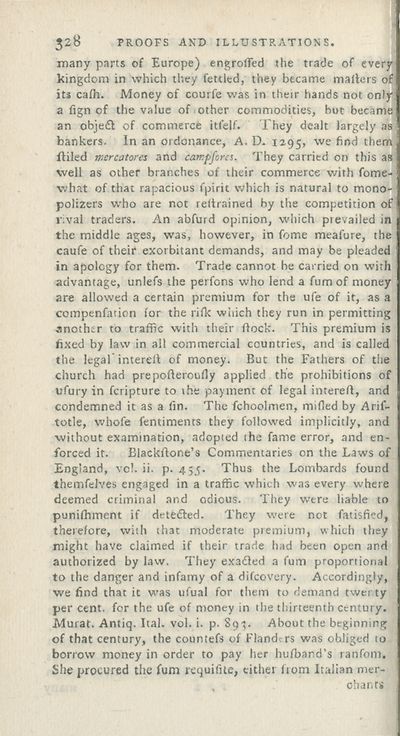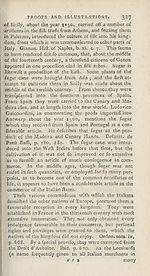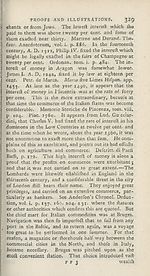Download files
Complete book:
Individual page:
Thumbnail gallery: Grid view | List view

J28 PROOFS AND ILLUSTRATIONS.
many parts of Europe) engrolTed the trade of every
kingdom in which they fettled, they became mailers of
its cafh. Money of courfe was in their hands not only
a fign of the value of other commodities, but became
an objeft of commerce itfelf. They dealt largely as
bankers. In an ordonance, A. D. 1295, we find them
fliled mcrcatores and carrpfcres. They carried on this as
well as other branches of their commerce with fome-
what of that rapacious fpirit which is natural to mono¬
polizers who are not rellrained by the competition of
r.val traders. An abfurd opinion, which prevailed in
the middle ages, was, however, in fome meafure, the
caufe of their exorbitant demands, and may be pleaded
in apology for them. Trade cannot be carried on with
advantage, unlefs the perfons who lend a fum of money
are allowed a certain premium for the ufe of it, as a
compenfation (or the rifk which they run in permitting
another to traffic with their flock. This premium is
fixed by law in all commercial countries, and is called
the legaT interell of money. But the Fathers of the
church had prepofleroufly applied the prohibitions of
ufury in feripture to ihe payment of legal intereft, and
condemned it as a fin. The fchoolmen, mified by Arif-
totle, whole fentiments they followed implicitly, and
without examination, adopied the fame error, and en¬
forced it. Blackflone’s Commentaries on the Laws of
England, vcl. ii. p.455. Thus the Lombards found
themfelves engaged in a traffic which was every where
deemed criminal and odious. They were liable to
puniffiment if detedled. They were not fatisfied,
therefore, with that moderate premium, which they
might have claimed if their trade had been open and
authorized by law. They exadled a fum proportional
to the danger and infamy of a difeovery. Accordingly,
we find that it was ufual for them to demand twenty
per cent, for the ufe of money in the thirteenth Century.
Murat. Antiq. Ital. vol. i. p. 891- About the beginning
of that century, the countefs of Flanders was obliged to
borrow money in order to pay her hufband’s ranfom.
She procured the fum requifite, either from Italian mer-
, chants
many parts of Europe) engrolTed the trade of every
kingdom in which they fettled, they became mailers of
its cafh. Money of courfe was in their hands not only
a fign of the value of other commodities, but became
an objeft of commerce itfelf. They dealt largely as
bankers. In an ordonance, A. D. 1295, we find them
fliled mcrcatores and carrpfcres. They carried on this as
well as other branches of their commerce with fome-
what of that rapacious fpirit which is natural to mono¬
polizers who are not rellrained by the competition of
r.val traders. An abfurd opinion, which prevailed in
the middle ages, was, however, in fome meafure, the
caufe of their exorbitant demands, and may be pleaded
in apology for them. Trade cannot be carried on with
advantage, unlefs the perfons who lend a fum of money
are allowed a certain premium for the ufe of it, as a
compenfation (or the rifk which they run in permitting
another to traffic with their flock. This premium is
fixed by law in all commercial countries, and is called
the legaT interell of money. But the Fathers of the
church had prepofleroufly applied the prohibitions of
ufury in feripture to ihe payment of legal intereft, and
condemned it as a fin. The fchoolmen, mified by Arif-
totle, whole fentiments they followed implicitly, and
without examination, adopied the fame error, and en¬
forced it. Blackflone’s Commentaries on the Laws of
England, vcl. ii. p.455. Thus the Lombards found
themfelves engaged in a traffic which was every where
deemed criminal and odious. They were liable to
puniffiment if detedled. They were not fatisfied,
therefore, with that moderate premium, which they
might have claimed if their trade had been open and
authorized by law. They exadled a fum proportional
to the danger and infamy of a difeovery. Accordingly,
we find that it was ufual for them to demand twenty
per cent, for the ufe of money in the thirteenth Century.
Murat. Antiq. Ital. vol. i. p. 891- About the beginning
of that century, the countefs of Flanders was obliged to
borrow money in order to pay her hufband’s ranfom.
She procured the fum requifite, either from Italian mer-
, chants
Set display mode to:
![]() Universal Viewer |
Universal Viewer | ![]() Mirador |
Large image | Transcription
Mirador |
Large image | Transcription
| Antiquarian books of Scotland > Kings & rulers > History of the reign of the Emperor Charles V. > Volume 1 > (346) |
|---|
| Permanent URL | https://digital.nls.uk/109186483 |
|---|
| Description | By William Robertson. London : Cadell and Davies, 1798. |
|---|---|
| Shelfmark | ABS.1.76.13 |
| Additional NLS resources: | |
| Description | Thousands of printed books from the Antiquarian Books of Scotland collection which dates from 1641 to the 1980s. The collection consists of 14,800 books which were published in Scotland or have a Scottish connection, e.g. through the author, printer or owner. Subjects covered include sport, education, diseases, adventure, occupations, Jacobites, politics and religion. Among the 29 languages represented are English, Gaelic, Italian, French, Russian and Swedish. |
|---|

